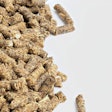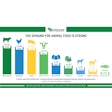
In recent years, there has been a growing interest in finding alternative feedstocks for livestock diets that can enhance performance, improve meat quality, and reduce environmental impact. One such alternative is sorghum, a versatile grain that has shown promising results in swine diets. In a collaborative effort, the U.S. Grains Council (USGC) and Animal Data Analytics (ADA) conducted a trial to evaluate the efficacy of sorghum in swine diets. The trial took place in Segovia, Spain, and aimed to assess the impact of sorghum on health, performance, fat firmness, meat quality, and environmental sustainability.
Feed trials are crucial in promoting the adoption of new feedstocks. Feed millers need to see the tangible benefits of incorporating alternative ingredients in their feed rations before making a switch. Without a thorough understanding of the return on investment, producers are often hesitant to consider alternatives to their locally available feedstocks. By conducting rigorous trials and providing comprehensive data, the USGC and ADA aim to encourage end users to incorporate sorghum into their feed rations.
The sorghum trial conducted by the USGC and ADA involved 288 pigs that were divided into three groups and fed different diets. The first group received a traditional Spanish control diet comprised of wheat and barley. The second group was fed a corn-based diet, while the third group received a sorghum-centric diet. The trial spanned over 77 days, with 28 days in the growing phase and 49 days in the finishing phase. At the end of the trial in February 2024, the impact of the different diets on health, performance, fat firmness, meat quality, and environmental sustainability will be measured and evaluated.
Previous studies have shown that incorporating sorghum in swine diets can lead to superior performance compared to other feedstocks. This is particularly evident when comparing sorghum to feedstocks native to Spain and its nearby trade partners. The quality of U.S.-grown sorghum is undisputed, and the USGC's commitment to agricultural research and testing further demonstrates its value to importers and international producers. The results of the sorghum trial in Spain will not only bolster sorghum's usage in the Iberian Peninsula but also in markets worldwide that prioritize elevated quality standards for pork products.
Benefits of Sorghum in Swine Diets
Incorporating sorghum in swine diets offers several benefits for both producers and consumers. Let's explore some of these benefits in detail:
- Improved animal health: Sorghum is rich in essential nutrients, including protein, fiber, and vitamins. It provides a well-balanced diet for swine, promoting overall animal health and well-being. The inclusion of sorghum in swine rations can help prevent nutrient deficiencies and support optimal growth and development.
- Enhanced performance: Studies have shown that sorghum-based diets can lead to improved performance in swine. Sorghum's nutrient composition, including its high energy content, promotes efficient feed conversion and weight gain in pigs. This can result in increased productivity and profitability for producers.
- Favorable meat quality: The inclusion of sorghum in swine diets can have a positive impact on meat quality. Sorghum-fed pigs have been found to exhibit desirable meat attributes, including tenderness, juiciness, and flavor. The unique composition of sorghum contributes to the development of high-quality pork products that meet consumer preferences.
- Environmental sustainability: Sorghum is considered a sustainable feedstock due to its lower environmental impact compared to other grains. It requires less water and fertilizer inputs, making it a more resource-efficient option. By incorporating sorghum in swine diets, producers can contribute to sustainable farming practices and reduce their carbon footprint.
The Future of Sorghum in Swine Diets
The results of the sorghum trial in Spain will provide valuable insights into the efficacy of sorghum as a feedstock for swine. If the trial demonstrates the superior performance of sorghum and its positive impact on health, meat quality, and environmental sustainability, it is likely to pave the way for increased adoption of sorghum in swine diets not only in the Iberian Peninsula but also in global markets.
The USGC's partnership with ADA and their commitment to conducting comprehensive trials and research further solidify the value of sorghum as a feed grain. As importers and international producers recognize the quality and benefits of U.S.-grown sorghum, the demand for sorghum in swine diets is expected to rise.
Incorporating sorghum in swine diets offers numerous benefits, including improved animal health, enhanced performance, favorable meat quality, and environmental sustainability. The ongoing sorghum trial conducted by the USGC and ADA in Spain will provide valuable data on the impact of sorghum on swine diets. If the trial confirms the superior performance of sorghum, it has the potential to revolutionize swine nutrition practices not only in Spain but also in global markets. As the demand for sustainable and high-quality feed ingredients continues to grow, sorghum emerges as a promising option for producers looking to optimize their feed rations and meet consumer preferences for premium pork products.


















